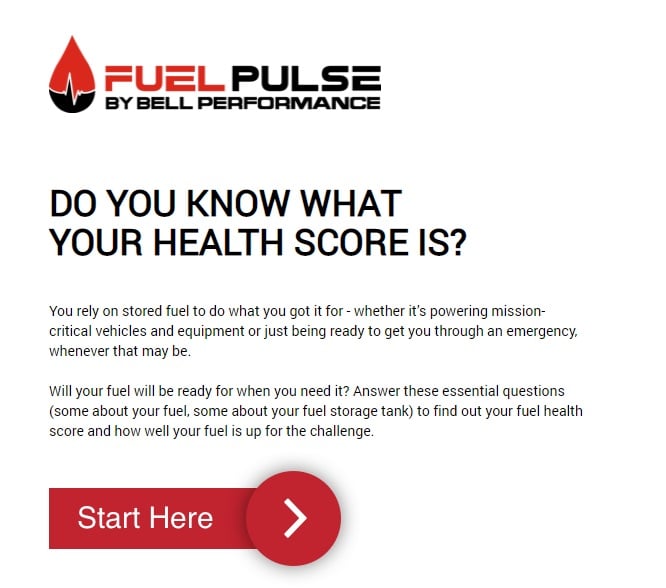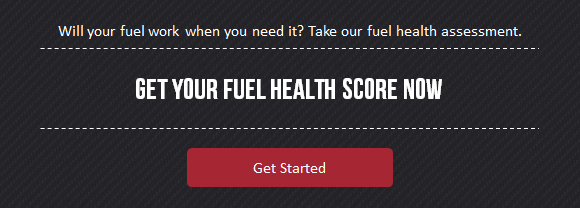What’s Your Fuel Health Score? The Webinar Transcript Part 3
As a service to our customers, dealers and friends, Bell Performance hosts quarterly webinars on fuel topics of interest to their friends and their...
6 min read
Erik Bjornstad : Jul 30 2019

As a service to our customers, dealers and friends, Bell Performance hosts quarterly webinars on fuel topics of interest to their friends and their customers. This is a transcript of one of these recent webinars ca;;ed What’s Your Fuel Health Score? We will be publishing it as a multi-part series. If you would like to watch the archived presentation, please click here. For the first part of the transcript, please click here.
So the first three questions in the tool established whether you've noticed changes in the fuels condition. With the fourth question, we're moving to consider perceived changes in how your fuel’s affecting what you use it in now. Fuel that's in good condition, fuel that's clean, it's bright, it's in-spec. A fuel that's working like it's supposed to, you know, that fuel’s going to make your equipment and your engines continue to run like they should. But when the fuel’s condition changes, for example, if it becomes unstable, starts to darken, drop some of its heavy-end components out of solution. Well, that kind of fuel may not burn cleanly in the engine, and you see it manifested in problems like you get an increase in some black smoke particulate produced by the engine, or maybe you see an increased change in your DPF filter regen cycles because you're getting more half-burned carbon ending up in that filter.
Or maybe, if you have stored diesel fuel and you have a microbial problem that's developed, that can affect fuel because microbial problems can degrade the cetane value. The microbes consume certain elements of the fuel, some of the higher cetane elements of the fuel. They consume those for food and the overall cetane value of that diesel fuel drops. If it drops enough, you'll start to notice a change in how the engine is performing. It's not performing like it typically does.
So even if you didn't know that you had a microbe problem or even if you didn't know that your fuel was unstable, you would see those effects change the way the engines perform when using the fuel.
This question establishes if you're operating under any requirements that dictate having to do specific sampling or testing of your store fuel. So in this context, when we're talking about these kinds of regulations, their presence may make it more likely that you keep proper tabs on the condition of your fuel, which means they make it more likely that you will notice problematic changes at an earlier time.
In that sense, regulatory requirements are good for stored fuel health because they require you to pay more attention to it, the fuel. This is especially true if you're in a certain, you know, business sector that requires not just sampling but also testing, like the healthcare sector. These regulations will force you to do best practice things that make ignoring the fuel not an option.
They have to do this because the fuel in those areas is what we call mission critical. It has a mission critical function. Like it's the emergency backup fuel for a hospital. Well, that's pretty important and it's too important to leave its condition to optional chance of course.
Having said all that, we have to point out that just because there's regulations in place and just because you may be following them, that doesn't in and of itself put you in the clear for fuel problems. It just means that you're required to pay closer attention to the fuel and you're more likely to detect fuel problems earlier versus somebody who isn't bound by these regulations.
There may also be some other best practices in your situation that you would want to follow as well. Like with respect to what to do about those problems once you've noticed them. So the presence of regulations is good, but doesn't necessarily just guarantee in itself that you're not going to have problems.
Question number six, about the halfway point here. Question six has you self-identify if your fuel is considered to be high turn or low turn. How long does your fuel sit in the storage tank before it's used up? Is it just a matter of days or like a week and then it's used up and you put more in, or does your particular storage tank only get refilled a handful of times a year?
What's the definition of high turn, right versus low turn? Well, there's no stock definition of those terms. It's something that requires a little bit of judgment on how you define what you have. Generally speaking, retail and fleet locations where the fuel is drawn from the tank on a daily basis or a semi daily basis, that's considered to be high turn fuel. Places that store fuel just for periodical use or emergency use, well, that would be considered to be low turn fuel. A good rule of thumb here is if your fuel sits in your tank for more than six months without getting used up, you would consider it a low turn fuel. And you can probably guess why all this is relevant, right? The longer that the fuel sits in storage, the greater the chance of any number of kinds of problems or conditions developing that can degrade the fuel’s condition. You might have a greater chance of microbial contamination. You might have greater chance of excess free water developing, you might have more time for oxidation reactions to more fully develop in the fuel, which leads to darkening and stratification.
That doesn't mean, if you have high turn fuel, that it puts you free and clear from problems like microbial contamination, contrary to what people might think. High turn fuel can develop its own fair share of problems, especially when you factor in that having problems develop isn't just about the condition of the fuels. It’s also about the condition of the storage tank as well. There may be plenty of problems brewing in the storage tank itself. So speaking in generalities, high turn fuel is less prone to certain types of degradation problems that might be more commonly seen in low turn fuel that sits in storage tanks for longer periods of time. But what's happening in their storage tanks might be a little bit of a different situation here.
All right, so the next question, question number seven, does your stored diesel fuel have a significant bio-diesel content? Today there's a lot more bio diesel in our nation's fuel supply then there was 10 years ago. And whether you love it or hate it, Bio-Diesel has some good aspects to it that a lot of people like. But the fact of the matter is that it does not do as well in storage as conventional petro diesel does and it's more prone to developing fuel health problems. And as you would expect, all other things being equal, the higher percentage of biodiesel you have in your fuel, the greater the chance of problems developing.
So to answer this question, we've got some choices here. You would choose between, yes I have B20 or higher, or no, my fuel is 5% or less biodiesel, or I don't know how much biodiesel content. After we put this together, we looked at this question and we said, well really this option, the 5% or less option, we should probably should have worded it to cover everything below B20. Yes, my fuel is B20 or higher, or my fuel, I have biodiesel but it's lower than B20. Biodiesel concentrations that are 20% or higher are much more prone to storage problems like the ability to see emulsification of water because biodiesel is hygroscopic. Very importantly they are more prone to developing microbial contamination because microbes do love to feast on biodiesel.
Now if you have bio but it's below 20%, then, again, speaking in generalities, you probably don't have anything more to worry about with your few health score than if you think that you're running conventional diesel. In other words, there's not a significant difference.
Keep in mind though that when we say conventional diesel, we are actually talking about two to 5% biodiesel anyway, because virtually all on road diesel fuel has some amount of biodiesel in it up to about 5%. Even the off-road diesel fuel that you get now is at the same risk.
The fourth option is I don't know. And why does it matter? We put together this tool and put that kind of option on a few of the questions because not knowing why something is important makes it more likely that you're going to be affected by whatever problem may be associated with that issue. I mean, think about it. You don't know what you don't know. You don't know what to look for. There's a certain problem that might develop and you wouldn’t know what to be looking for. So ignorance and these kinds of questions, these kind of really can hurt you and your fuels.
Okay. Question number eight, have you added any kind of fuel additive or fuel treatment chemicals to your stored fuel in the last, say, six months or so?
This question speaks to the same conceptual thing that several of the previous questions did. How closely are you monitoring your fuel’s condition? If you have treated your fuel with some kind of additive in the last six months, irrespective of what additive you put in (which there are many), just the simple fact that you did that makes it more likely that you are paying closer attention to the condition of your fuel, at least enough to do the work of pulling samples and looking at them and making the decision to add a treatment to the fuel.
Right? So awareness in this case really does increase the chances of good fuel health. Having said that, it does matter what you treated your fuel with. But in the interest of keeping things simple here, we know that we can't account for every possible kind of fuel additive, nor can we account for whether you know which ones are good, which ones are bad, et cetera. So this may be somewhat of a generalization here.
This question eight is really more about confirming how closely you're paying attention to your stored fuels condition, which is the first step to keeping that fuel healthy and in good condition.
The next post we will continue with Question #9 - Changing Tank Filters.


As a service to our customers, dealers and friends, Bell Performance hosts quarterly webinars on fuel topics of interest to their friends and their...

As a service to our customers, dealers, and friends, Bell Performance hosts quarterly webinars on fuel topics of interest to their friends and their...
One thing that sets apart a good tank servicing or fuel polishing partner from a no-so-good one is their familiarity with fuel testing. The better...